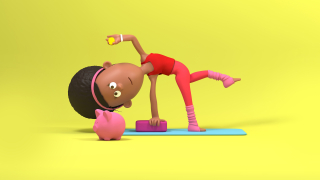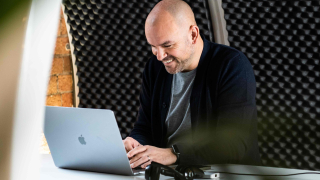
Have we got any gamblers here? Because I bet you a pint that if you asked one hundred non creative industry or business-minded people what a brand is, the majority of those people will pick out a single element or two.
And I think the probability is high that the answers you receive will include: A logo. A product. A company.
They wouldn’t be wildly wrong, but successful brands do well because they know those elements alone just won’t do, because a brand is so much more than that…
A brand is more than just a logo
I feel like this is a sentence I say a lot, but it’s important to emphasise it: A brand is more than just a logo.
I asked my husband (who affectionately refers to my job as ‘colouring in’) what the best logo in the world was and why.
His answer was instant: Apple. Because ‘you see the logo and instantly know what it is’.
But the two dimensional apple silhouette with a single bite taken from it doesn’t tell you what the company is or does.
My husband has built up a perception of Apple over decades. Because he has bought into its product. He has bought into the fact that the company is pioneering, and in 2007 redefined the mobile phone market. He’s even bought into the mystique of the late Steve Jobs.
So when he sees that simple icon that needs not the company name, nor a strap line to speak to people, his subconscious fills in the rest. His eyes see an icon, his brain reads: ‘tech manufacturer that makes products that I love’. It conjures a holistic view in his mind.
There aren’t many brands that could drop the company name from their logo and remain just as recognisable as Apple is.
The brands that can are household names, and they have products that are part of the global psyche. Ingrained across cultures the world around. The Pepsi roundel. The Nike swoosh. The chirping bird of Twitter.
So how did those brands achieve their omnipresent status? When a simple icon triggers instant recognition, and more importantly, seemingly tells people what they are about (as well as what they do)?
Well, it definitely involved a product…
A brand is more than just a product
Instantly recognisable the world over are the golden arches that tower high over this fast food chain’s outlets. I don’t need to tell you which company I’m talking about. You already know it’s McDonalds.
But you don’t know McDonalds because of its logo, as famous and iconic and universal as it is. You know McDonalds because of its product - those mouthwatering burgers, those moreish fries. Or do you?
Why is this particular company synonymous with burgers? Because I bet while you might enjoy a BigMac (that’ll be a McPlant for me), your ultimate burger perhaps comes from another chain, or even an independent restaurant. McDonalds doesn’t make the best product ever. So why is it so successful the world over? And why do you know about the BigMac above other, more salivating burgers out there?
You know McDonalds because of Ray Croc. Ray dreamed of redefining fast food, and he elevated those ambitions through the reimagining of the typical franchise model, leveraging the McDonalds brothers’ strategic layout of a kitchen (the Speedee Service System) and an ambitious growth plan. He enabled McDonalds global expansion. The product wasn’t revolutionary, but the driving force behind it was.
A brand is more than just a company
Let’s talk about Patagonia. An outdoor brand that began selling mountain climbing gear in 1973. It has grown into more than just a company that sells outdoor clothes and sporting gear.
Patagonia has become an aspirational lifestyle brand, synonymous with ethics and sustainability - not least because it’s founder Yvon Chouinard was a founding member of One Percent For The Planet, or that he recently announced that he was transferring ownership of the company to a trust, pledging its future profits to help halt climate change and to protect our planet.
The company has continued to strengthen its proposition, earn more respect, and has become quite simply enviable, with its clear and defined purpose.
Chouinard has ensured that even without his guidance, Patagonia’s brand values will continue to be lived out even when he’s not around to oversee them. He’s forged a legacy.
It goes to show that a brand can become so much bigger than the people behind it, and more so to its audience. A brand can survive beyond the lifespan of any CEO, and live in the hearts of outdoor lovers and environmentalists the world over. A great brand thinks about the greater good. A great brand makes a difference. A great brand resonates.
The difference between good and great
It’s true that we make assumptions, consciously or not, about companies and products based on how they are presented. That’s why we must present brands well.
The surface gloss has to be just right, but remember this: a nice logo won’t cover up a bad product. Nor will a good product succeed against a similar one if it doesn’t set itself apart. And if the company isn’t thinking about that bigger picture, then that lack of purpose will show.
Your foundations are vital. They might not be visible to the naked eye, but if they are strong, you can build your brand upon them.
Strategy, purpose and values must always come before creative. But they absolutely must weave together and intertwine. And when they come together? That’s when the magic happens.
Your brand will be more than just a logo, a product or a company. Your brand will have a beating heart, and a reason to thrive. It will be filled with discernible purpose that resonates and connects with audiences beyond a superficial level. You’ll take the good and make it great.







